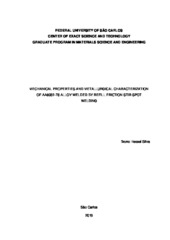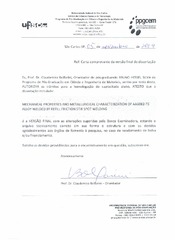| dc.contributor.author | Silva, Bruno Hessel | |
| dc.date.accessioned | 2019-11-19T13:57:29Z | |
| dc.date.available | 2019-11-19T13:57:29Z | |
| dc.date.issued | 2019-07-30 | |
| dc.identifier.citation | SILVA, Bruno Hessel. Mechanical properties and metallurgical characterization of AA6082-T6 alloy welded by refill friction stir spot welding. 2019. Dissertação (Mestrado em Ciência e Engenharia de Materiais) – Universidade Federal de São Carlos, São Carlos, 2019. Disponível em: https://repositorio.ufscar.br/handle/ufscar/12027. | * |
| dc.identifier.uri | https://repositorio.ufscar.br/handle/ufscar/12027 | |
| dc.description.abstract | The efforts to produce automobiles with intense use of aluminum alloys is growing and the 6XXX series of aluminum alloys are important for this scenario. However, the current joining technologies applied in these alloys present limitations regarding weld uniformity, energy input and production costs. Refill Friction Stir Spot Welding (RFSSW) is a solid-state welding technique with potential to surpass these limitations. In order to validate this technique in automotive applications, issues must be addressed such as obtaining mechanical properties standards; determining the effect of process parameters on weld structure and properties; optimizing cost-efficiency factors and others. In this work the application of RFSSW in the AA6082-T6 alloy was studied focusing on: (i) the effect of process parameters on weld structure and mechanical properties; (ii) understanding of fracture behavior of the welds under static and cyclic load; and (iii) the influence of Bake Hardening treatment on the weld structure and properties. Optimized process parameters set with suitable welding time for industry applications were obtained using statistical analysis maximizing static mechanical properties. Macro/microstructural analysis were carried out and demonstrated that the Plunge Depth parameter has the most relevant influence on weld strength and fracture behavior due to its effect in hook shape formation, which is an intrinsic feature in RFSSW welds. Hardness and thermal characterization helped to understand the effect of Bake Hardening on reprecipitation and overaging process in different weld regions and, consequently, on the mechanical properties and fracture behavior of the welds. Using Weibull Statistical analysis, L-N fatigue curves were obtained and demonstrated that, regardless the hook shape, the curves presented similar trend and fatigue limit close to 12% of the maximum Shear Load. Finally, based on fatigue fracture surface characterization, it was found that the hook shape configuration has a relevant effect on fracture behavior only for low-cycle load conditions. | eng |
| dc.description.sponsorship | Conselho Nacional de Desenvolvimento Científico e Tecnológico (CNPq) | por |
| dc.language.iso | eng | por |
| dc.publisher | Universidade Federal de São Carlos | por |
| dc.rights | Attribution-NonCommercial-NoDerivs 3.0 Brazil | * |
| dc.rights.uri | http://creativecommons.org/licenses/by-nc-nd/3.0/br/ | * |
| dc.subject | AA6082-T6 | por |
| dc.subject | Solda a ponto por fricção | por |
| dc.subject | Bake Hardening | eng |
| dc.subject | Propriedades mecânicas | por |
| dc.subject | Fadiga | por |
| dc.subject | Fratura | por |
| dc.subject | Refill friction stir spot welding | eng |
| dc.subject | Mechanical properties | eng |
| dc.subject | Fatigue | eng |
| dc.subject | Fracture | eng |
| dc.title | Mechanical properties and metallurgical characterization of AA6082-T6 alloy welded by refill friction stir spot welding | eng |
| dc.title.alternative | Propriedades mecânicas e caracterização metalúrgica da liga AA6082-T6 soldada por solda a ponto por fricção | por |
| dc.type | Dissertação | por |
| dc.contributor.advisor1 | Bolfarini, Claudemiro | |
| dc.contributor.advisor1Lattes | http://lattes.cnpq.br/9231627080617037 | por |
| dc.contributor.advisor-co1 | Zepon, Guilherme | |
| dc.contributor.advisor-co1Lattes | http://lattes.cnpq.br/7924187202036614 | por |
| dc.description.resumo | Esforços para produção de automóveis com intenso uso de ligas de alumínio têm aumentado e ligas da série 6XXX são importantes neste cenário. Entretanto, técnicas de união aplicadas nessas ligas apresentam limitações na uniformidade das soldas, eficiência energética e custos de produção. A solda a ponto por fricção (RFSSW) é uma técnica de união no estado sólido com potencial para superar tais limitações. Para validar RFSSW em aplicações industriais é necessário avaliar fatores como propriedades mecânicas exigidas em norma; efeito dos parâmetros de processo nas características da solda; produtividade, custo e outros. Este trabalho apresenta um estudo da aplicação de RFSSW na liga AA6082-T6 para a indústria automotiva focando em: (i) efeito dos parâmetros de processo nas propriedades mecânicas e estrutura da solda; (ii) comportamento em fratura; (iii) influência do tratamento Bake Hardening nas propriedades mecânicas e características estruturais. Um conjunto de parâmetros com tempo de solda viável industrialmente foi obtido maximizando propriedades mecânicas usando análises estatísticas. Caracterizações macro/microestruturais demonstraram que o parâmetro de profundidade de penetração apresenta maior influência na resistência mecânica e no comportamento em fratura da solda devido influência na formação do defeito hook. Caracterizações térmicas e de dureza demonstraram o efeito do Bake Hardening na reprecipitação e superenvelhecimento nas regiões da solda e, consequentemente, nas propriedades mecânicas e comportamento em fratura. Através da estatística de Weibull, curvas de fadiga L-N demonstraram que independente do formato do hook, o comportamento em fadiga é similar (12% da máxima carga de cisalhamento). Caracterizações da superfície de fratura demonstraram que o formato do hook tem efeito relevante no modo de fratura apenas para condições de fadiga de baixo ciclo. | por |
| dc.publisher.initials | UFSCar | por |
| dc.publisher.program | Programa de Pós-Graduação em Ciência e Engenharia de Materiais - PPGCEM | por |
| dc.subject.cnpq | ENGENHARIAS::ENGENHARIA DE MATERIAIS E METALURGICA::INSTALACOES E EQUIPAMENTOS METALURGICOS | por |
| dc.subject.cnpq | ENGENHARIAS::ENGENHARIA DE MATERIAIS E METALURGICA::METALURGIA DE TRANSFORMACAO | por |
| dc.subject.cnpq | ENGENHARIAS::ENGENHARIA DE MATERIAIS E METALURGICA::METALURGIA FISICA | por |
| dc.description.sponsorshipId | CNPq: 139293/2018-3 | por |
| dc.publisher.address | Câmpus São Carlos | por |
| dc.contributor.authorlattes | http://lattes.cnpq.br/6735270859581901 | por |


